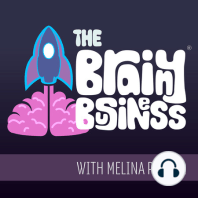59 min listen

279. Creating an Irrational Loyalty Program at McDonald's with Lauren Kemp & Stephen Springfield
FromThe Brainy Business | Understanding the Psychology of Why People Buy | Behavioral Economics
279. Creating an Irrational Loyalty Program at McDonald's with Lauren Kemp & Stephen Springfield
FromThe Brainy Business | Understanding the Psychology of Why People Buy | Behavioral Economics
ratings:
Length:
59 minutes
Released:
Apr 14, 2023
Format:
Podcast episode
Description
In today's conversation, I am joined by McDonald’s Lauren Kemp and Stephen Springfield from the Aspen Center for Consumer Science. Last fall I saw them give a talk at IIEX Behavior on how they used behavioral science to create an "irrational" loyalty program at Mcdonald's. It was instantly clear they had to be on the show to talk about this project, its insights, and what you can learn from it. It is such a great case study showing how real people inside organizations (and in this case, working with a great consultant), can create a program that infuses behavioral insights in a smart way -- that is often counterintuitive – to find a win-win for the company and its customers. You'll also hear tips from Lauren about how she did her literature review and lots of other great insights. And, do know that while we joke about not loving the term "irrational" as it is popularly used in behavioral science, if there was ever a program that proved a lot of the choices people make aren’t exactly rational this would be it. You'll see what I mean as they dig in on the story in the episode… Show Notes: [00:46] In today's conversation, I am joined by Lauren Kemp and Stephen Springfield, whom I first saw while they were giving a presentation at Greenbook’s IIEX Behavior last fall. [03:44] Lauren shares about herself and her background. She works in consumer insights at McDonald’s on the US team. [04:41] Stephen shares about himself and his background. Stephen is the Founder and Principal at Aspen Center for Consumer Science. [06:43] Novelty and the magic of the irrational attracted Stephen to behavioral science and behavioral economics. [07:35] Behavioral science isn’t really about the irrational and the crazy cool stuff. It is about the scientific process applied to understanding behavior. [10:35] Irrationality is where all the profit is. [13:05] Lauren started her career with an internship at Brain Juicer. They were pioneers in the behavioral economic space. McDonald’s was one of her main clients there. [15:17] McDonald’s global team created the loyalty program so the individual markets had some space to make the program work in their specific market. [17:17] She started with a literature review since loyalty programs were not new to the industry. She wanted to learn what was most important for a loyalty program and how they could design theirs to be successful. [19:45] Top tips for doing your own literature review? Definitely start by bookmarking Google Scholar. [22:11] The program needed to entice customers to engage with the program. They wanted it to be consumer centric. [24:16] They knew it was very important for the program to be transparent enough and easy to understand. Consumers don’t like it when they feel they are being tricked or it is clouded. Transparency is so huge in our culture today. [25:57] They found that the value of a loyalty program is engagement with the program itself – not the reward that you get. The reward you get is transactional. [28:27] Lauren spent a week or two on her literature review process and Stephen’s team did some additional research. [30:39] It is important to invest the time in research, but it probably doesn’t need to take as long as you think. [33:21] There is an aspect of irrationality and that is where the profit is. You have to find a way to offer something of value that is not completely transactional. [36:23] They wanted to find which items would drive trips because the point of the loyalty program is to get to people to visit more often. [37:58] They tested five different point levels from 1 point to 10,000 points. They found that 100 points per dollar was easy and worked best. [40:03] The goal is to get somebody to purchase something now with an eye toward achieving something later. Mental budgeting and being able to do the math towards a simple reward was a game changer. [43:05] They continued coming back to the goal and objective: getting consumers to come to McDonald’s b
Released:
Apr 14, 2023
Format:
Podcast episode
Titles in the series (100)
19. Herding: Come On And Listen…Everyone Else Is Doing It: Herding is the topic of today’s behavioral economics podcast foundations episode. This concept is similar to the way animals herd and for many of the same reasons. For safety, being in the center of the herd offers protection from predators. There... by The Brainy Business | Understanding the Psychology of Why People Buy | Behavioral Economics